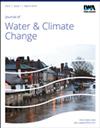Assessing the effects of dam regulation on multiscale variations in river hydrological regime and ecological responses
IF 2.7
4区 环境科学与生态学
Q2 WATER RESOURCES
引用次数: 0
Abstract
Using a combination of the long short-term memory model and hydrological change indicators, this study proposes an assessment framework at inter-annual and intra-annual scales to quantify the hydrological regime changes and ecological event responses caused by the regulation of the Three Gorges Dam (TGD) in the upper reaches of the Yangtze River. The results indicate that during the post-TGD period (2004–2019), 2 indicators of the natural flow regime undergo a high degree of alteration at the inter-annual scale, which increase to 12 when regulated flows are considered. Furthermore, we find that while climate and incoming water change significantly reduces the annual flow and monthly flow during the flood season, it increases the complexity (79%) and ecodeficit at the seasonal scale (94%). Among the 32 indicators of hydrologic alteration, TGD is the dominant factor influencing changes in 20 indicators, increasing the magnitude of low-flow events, decreasing the frequency of high-flow pulses, and advancing the timing of 1-day minimum flow (43 Julian date). From the hydrological perspective, the altered rising water conditions due to TGD regulation may cause an average decrease of 19.5% in the fry abundance for the Four Famous Major Carps.评估大坝调节对河流水文机制和生态响应多尺度变化的影响
本研究采用长短期记忆模型和水文变化指标相结合的方法,提出了一个年际和年内尺度的评估框架,以量化长江上游三峡大坝(TGD)调节引起的水文过程变化和生态事件响应。结果表明,在后三峡大坝时期(2004-2019 年),自然水流状态的 2 个指标在年际尺度上发生了较高程度的变化,如果考虑调节流量,则变化程度会增加到 12 个。此外,我们还发现,虽然气候和来水变化显著减少了洪水季节的年流量和月流量,但却增加了季节尺度的复杂性(79%)和生态赤字(94%)。在 32 个水文变化指标中,TGD 是影响 20 个指标变化的主导因素,它增加了低流量事件的规模,降低了高流量脉冲的频率,并提前了 1 天最小流量的时间(43 个朱利安日期)。从水文角度看,TGD 调节导致的涨水条件改变可能会使四大名鲤的鱼苗数量平均减少 19.5%。
本文章由计算机程序翻译,如有差异,请以英文原文为准。
求助全文
约1分钟内获得全文
求助全文
来源期刊

Journal of Water and Climate Change
WATER RESOURCES-
CiteScore
4.80
自引率
10.70%
发文量
168
审稿时长
>12 weeks
期刊介绍:
Journal of Water and Climate Change publishes refereed research and practitioner papers on all aspects of water science, technology, management and innovation in response to climate change, with emphasis on reduction of energy usage.
 求助内容:
求助内容: 应助结果提醒方式:
应助结果提醒方式:


